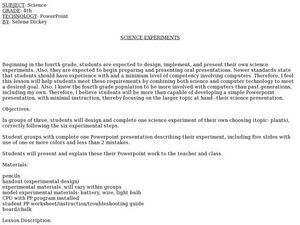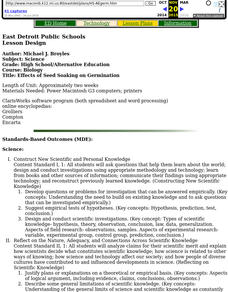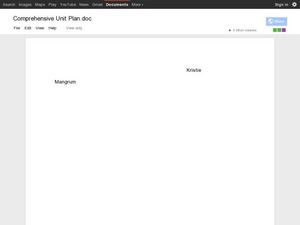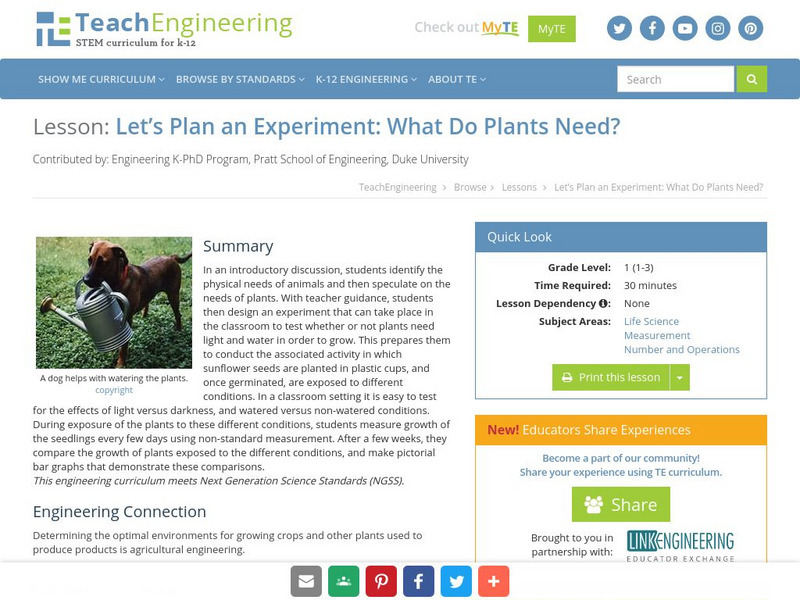Curated OER
Floating and Falling Flows
Students discover fluid dynamics related to buoyancy through experimentation and optional photography. Using one set of fluids, they make light fluids rise through denser fluids. Using another set, they make dense fluids sink through a...
Curated OER
Field Experiments on Succession
Student develop a hypothesis regarding the effects of either mowing or fertilizer upon the diversity of plant species in a grassland ecosystem. They set up experiment field plots and measure species richness.
Serendip
A Scientific Investigation – What Types of Food Contain Starch and Protein?
You are what you eat, as they say! Are you more starch or more protein? Young scholars use their knowledge of each component to test different foods for their content. Using multiple indicators, individuals describe the protein and...
Curated OER
Amazing Bean Races
Students experiment with bean growth in varied conditions. In this plant biology instructional activity, students plant beans in soil and in spun cellulose (absorbent material in diapers) and measure the growth of their seedlings. They...
Curated OER
One, Two, Three. TMV
Students, in groups, design their own experiments to determine how the mode of application of the virus extract affects the various plants that students have grown from seed.
Curated OER
Science Experiments
Fourth graders work together in groups to design and complete one science experiment of their choice. Following the experimental steps, they show their experiment and the results to the class in the form of a PowerPoint. They explain...
Curated OER
Teaching Biology Through Problem-based Activities
Students plant seeds and observe the life cycle of the organism. They experimentally research the effects of radiation on seed growth. Students determine the effects of environmental pollutants on harvested seed.
Curated OER
Where Do Weeds Grow Best?
Student design an experiment in order to determine where weeds grow the best. Through data collection and observations, they discover optimum conditions for weed growth, conditions that make it difficult for weeds to grow, and create...
Curated OER
Effects of Seed Soaking on Germination
Young scholars explain the standard growth pattern of a monocot seedling and word process a finished essay.
Curated OER
A Constructivist Version of the Snail & Elodea Lab
Students explain the importance of having a control when setting up an experiment.
Curated OER
Biodiversity Study -- A Unit Study
Students sample a site with low human impact, one with moderate human impact, and a third with high human impact. Students chart the data for each site and then compare the sites and discuss.
Curated OER
What Do Snails Eat?
Students conduct a food choice experiment with snails, recording the results on a chart to determine what snails eat. In this what do snails eat activity, students color a picture of snail anatomy, perform the experiment with 3 food...
Curated OER
Herbal Medicines
Students become critical thinkers about substances that are called medicines and it guides them into an inquiry process of carrying out their own investigations of the attributes of some common herbal remedies.
Curated OER
The Life Cycle of the Mealworm
Fourth graders provide a habitat for live mealworms and observe their life cycle. In this animal life cycle and scientific inquiry lesson plan, 4th graders create a habitat for a live mealworm and observe and record related data as it...
Curated OER
Earth Day Lessons With The Right Stuff
Earth Day lessons provide a great way to teach students about the significance of the event, and how they can make a difference.
Curated OER
Cotton and Cabbage
Students note how given traits could be achieved by selective breeding and by transgenesis. They identify different uses of GEO. Students recognize that the use of letters (Bt) before an organism's name means that the organism has had a...
Curated OER
Biofuels Blast!
Students observe yeast fermentation using different energy source. In this chemistry instructional activity, students measure the gas collected in the balloon. They upload their observations on the internet so they can share it with kids...
Curated OER
Check Out Lights and Shields with Beads
Learners explore Ultraviolet detecting beads and conduct several investigations with them. In this investigative lesson students participate in an experiment to see the harmful effects of UV light and discuss their findings.
Curated OER
Plant Biotechnology: Controlling Tissue Differentiation
Students demonstrate hormonal control of plant tissue differentiation and relate this differentiation to gene expression. They explore the effects of hormones (auxin and cytokinin) on the genes that control tissue differentiation in callus.
Curated OER
Plant Biotechnology: Controlling Tissue Differentation
Young scholars demonstrate skills of biotechnology stringent aseptic technique and statistical analysis. They describe hormonal control of plant tissue differentiation and relate this to gene expression. Students observe the effects of...
TeachEngineering
Teach Engineering: Who Needs What?
The teacher leads a discussion in which students identify the physical needs of animals, and then speculate on the needs of plants. With guidance from the teacher, the students then help design an experiment that can take place in the...






















